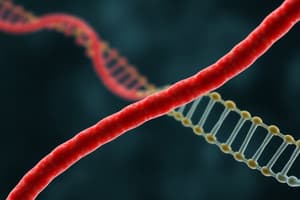Podcast
Questions and Answers
Which DNA polymerase requires transcription factors to bind to its promoter during replication?
Which DNA polymerase requires transcription factors to bind to its promoter during replication?
- Polymerase II
- Polymerase III
- Polymerase IV
- Polymerase I (correct)
Which enzyme reduces nucleoside triphosphate to deoxyribonucleotide triphosphate during DNA replication?
Which enzyme reduces nucleoside triphosphate to deoxyribonucleotide triphosphate during DNA replication?
- Ribonucleotide reductase (RNR) (correct)
- Topoisomerase
- Helicase
- Polymerase IV
Which enzyme plays a crucial role in converting nucleotide precursors into building blocks required for DNA synthesis?
Which enzyme plays a crucial role in converting nucleotide precursors into building blocks required for DNA synthesis?
- Thymidine kinase (TK) (correct)
- Primase
- Helicase
- Ligase
Which of the following is NOT a DNA polymerase involved in DNA replication?
Which of the following is NOT a DNA polymerase involved in DNA replication?
How does gene expression indirectly impact DNA replication?
How does gene expression indirectly impact DNA replication?
What can happen to DNA replication if the gene encoding thymidine kinase is mutated?
What can happen to DNA replication if the gene encoding thymidine kinase is mutated?
Why can transcription and replication occur simultaneously in bacteria?
Why can transcription and replication occur simultaneously in bacteria?
What happens in eukaryotes to ensure coordination between DNA replication and transcription?
What happens in eukaryotes to ensure coordination between DNA replication and transcription?
How does DNA damage impact gene expression?
How does DNA damage impact gene expression?
What can unrepaired DNA damage lead to if left unattended?
What can unrepaired DNA damage lead to if left unattended?
How does gene expression relate to DNA replication?
How does gene expression relate to DNA replication?
Why is it crucial to understand and control gene expression during DNA replication?
Why is it crucial to understand and control gene expression during DNA replication?
Flashcards are hidden until you start studying
Study Notes
Gene Expression During DNA Replication
DNA replicates during each cell cycle when cells divide, ensuring that genetic information is passed on accurately from parent to daughter cells. However, this process can also affect gene expression, which is the activation of genes to produce proteins necessary for various cellular functions. In the context of DNA replication, gene expression can have both direct and indirect effects on the process itself.
Direct Effects on DNA Replication
Some genes directly participate in DNA replication. For instance, ribonucleotide reductase (RNR) reduces nucleoside triphosphate to deoxyribonucleotide triphosphate, which is essential for DNA synthesis. Additionally, DNA polymerases, such as Pol I, II, III, and Pol β, require transcription factors that bind to their promoters to facilitate their function during replication.
Indirect Effects on DNA Replication
Gene expression can also indirectly impact DNA replication by influencing the availability of building blocks for nucleic acid synthesis. For example, the enzyme thymidine kinase (TK), encoded by a specific gene, plays a crucial role in conversion of nucleotide precursors into building blocks required for DNA synthesis. Furthermore, gene expression can regulate the activity of different DNA repair mechanisms, which may influence DNA replication fidelity.
Synchronization of DNA Replication and Transcription
In some organisms like bacteria, the processes of transcription and replication can occur simultaneously because they share the same machinery. However, in eukaryotes where these two processes are spatially separated, there seems to be coordination between them. This synchronization ensures that the newly synthesized RNAs do not interfere with ongoing DNA replication.
Impact of DNA Damage on Gene Expression
When DNA damage occurs, the stress response activates genes responsible for initiating DNA repair pathways. These responses can lead to changes in protein levels, affecting cell division and thus altering gene expression. If the damage remains unrepaired, it could result in mutations and ultimately, cancer.
Conclusion
Gene expression has significant implications for DNA replication, ranging from direct participation in the replication process to indirect effects through regulation of key components involved in DNA synthesis and repair. Understanding and controlling gene expression during DNA replication is crucial for maintaining genomic stability and preventing diseases associated with abnormal DNA replication or altered gene expression patterns.
Studying That Suits You
Use AI to generate personalized quizzes and flashcards to suit your learning preferences.




